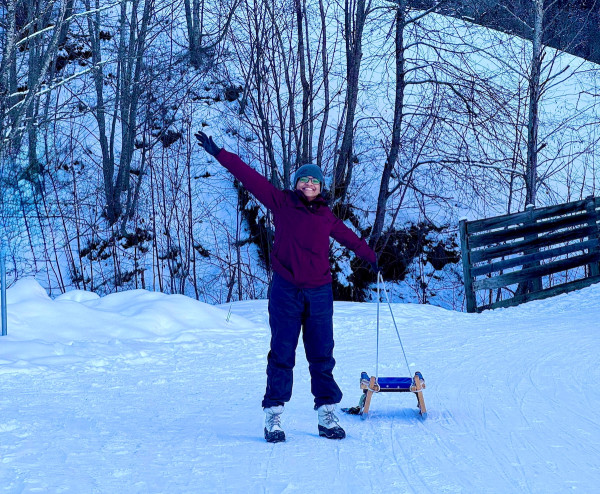Jayashree Narayan
Interview by Nicola Nosengo, NCCR MARVEL on 20 February 2025
Have you always been interested in science?
There was a specific moment when my interest began. In India, most students go through extra coaching outside of school while growing up. I was an average student, so I also went to one of these in the 8th grade. The tuition continued for about four hours after school until late at night. One day, ten minutes before this class ended, my physics teacher asked us what we thought the speed of light was. I was half asleep, but that sentence woke me up. I didn’t know that light as a physical object could have a speed.
That night, when my dad picked me up from class, I rambled about what I just learned, and he suggested I should become an astrophysicist. That idea stayed with me, even though I did not know what an astrophysicist does. When the time came, I chose IISER Mohali to pursue astrophysics research. When I described my passion to my professors at university, they told me to keep my options open and not rush into any field. It was the best advice I got. I explored high energy physics, experimental condensed matter physics, and astrophysics, and now I’m here. During one of my projects, I realised that I loved coding and simulation. I was fascinated by the algorithms being used in all my projects. I realised I would be happy doing any project involving modelling and simulation of a natural system. I am still fascinated by problems in astronomy, and my internships helped broaden my interest in other areas of physics.

Jayashree Narayan
How did you hear about the INSPIRE Potentials Program?
When it was time for me to do my master's thesis project, I was trying to find positions outside of my country for the experience. One of my friends saw the MARVEL INSPIRE fellowship advertisement and told me about it.
What is the topic of your master’s project?
The main objective of my thesis is to efficiently implement a recently developed method called Poisson-MaZe to simulate the electrostatic interactions of charged-point particles in classical molecular dynamics. The algorithm uses Mass-zero constrained dynamics and is based on a constrained extended Lagrangian formalism to integrate the Poisson equation. It holds some promise of computational gains compared to other standard methods for highly parallelised setups. The test system considered in our applications will be a liquid molten salt. My work is to learn and help implement OpenMP and MPI parallelisation strategies into the Poisson-MaZe code to make it compete (in speed and performance) against the previously existing Particle Mesh Ewald method that achieves the same goal. We also want the code to be used by anyone who wants to, so I am also working on making it user-friendly and trying to implement it as a library.
Do you think women face specific challenges in the sciences?
When I started my bachelor's, I had no idea women were not seen equally in science. I watched a documentary called “Picture a Scientist” on Netflix in my second year. It is a 2020 documentary on gender inequality in science. It follows prominent female researchers, including MIT biologist Nancy Hopkins, chemist Raychelle Burks, and geoscientist Jane Willenbring, highlighting the discrimination and harassment they faced. Watching this made me realise that it would not be easy if I wanted to continue in academia. In my third year, some of my seniors started a group called the “Women In Physics, Math and Astronomy” (WiPMA) to help the female student community talk about these issues, which were rarely agreed upon as legitimate. As a part of this group and a convener for a term, we held several talks and meetings between students to discuss the issues women face in physics and math, and we had discussions to validate the feelings women have in the community but don't speak out about. I think it helped instil confidence in me and in the women of my university. It also helped raise awareness of discrimination that can exist.
I care very deeply about this issue, and I think many problems come from the fact that women are not taken seriously. I’ve seen it take place in fields like engineering. It’s saddening, but I hope to see a time when women are truly equal in the eyes of society.
Any advice for young girls interested in science?
One of the biggest problems I've seen amongst women (at least in India) is a lack of confidence in themselves. Women should stop doubting themselves. In my first year, this self-doubt kept me from applying for internships – the thought that I may not get accepted. In my second year, I decided not to take that self-doubt seriously and showed everyone that I was confident in myself - even if I was not. From that moment on, the opportunities started flowing. So, I kept putting myself out there. This applies to all young people and especially to women. So, my advice is to just send the email. You lose nothing even if they say ‘no’, and you can gain everything if they say ‘yes’. But you stay stagnant if you don’t send the email.
What are your plans for the future?
I want to do a PhD in a field that can help me work on computational physics. The specific field is not my biggest concern as long as I like the project. After that, I would like to move to industry, but that depends on where my PhD takes me. I would love to stay in Lausanne if possible – it’s such an international and diverse environment, and I love it.
